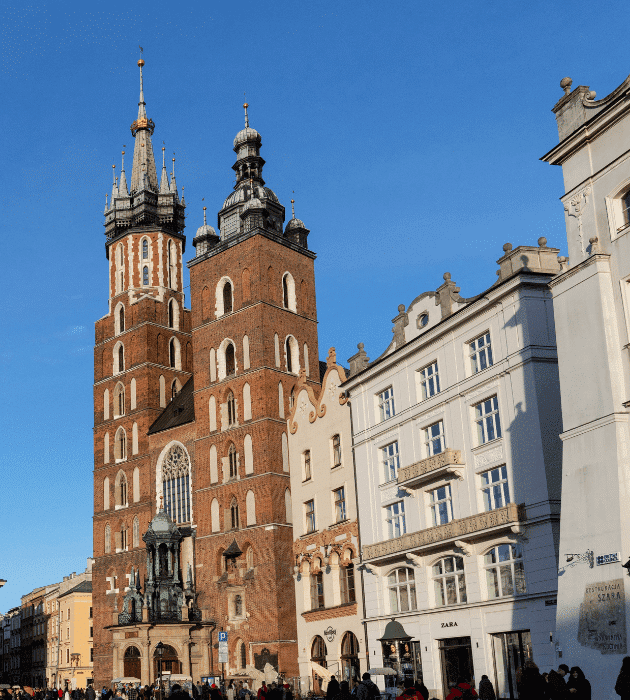-
Popular search terms
A Comprehensive Guide to Studying in:
Poland

More and more international students are choosing to study in Poland, where tuition is free at the country’s public universities and the cost of living is among the lowest in the EU. It is so much more than an affordable place to study.
Poland is a country steeped in history; the birthplace of scores of world-famous individuals who have influenced almost every aspect of human society. Poland respects and upholds its proud traditions, but since the 1990s it has increasingly become a modern, forward-thinking nation with a diverse population. Whether it’s the elegant architecture of capital Warsaw, the bohemian spirit of Kraków, or the student-friendly vibe in Wrocław, Poland’s major cities offer something for everyone. The country is also home to a number of globally-respected universities that are ranked among the best in the continent.

Frequently Asked Questions
FAQ
Did You Know? Fun Facts About Poland
- 1 Tuition is free for EU/EEA citizens at Poland’s public universities, and heavily discounted for other students.
- 2 Pope John Paul II, who was Polish, became the first non-Italian Pope since the 16th century when he was elected in 1978.
- 3 Poland’s varied geography includes miles of coastline, two major mountain ranges, more than 10,000 lakes, and even a desert.
- 4 With a population of around 1.8 million, Poland’s capital Warsaw is the sixth-biggest city in the European Union.
- 5 Marie Curie is perhaps the most famous Polish person of all time. She was the first woman to win a Nobel Prize and the first person to win a Nobel Prize twice.
Which Visas & permits do i need in Poland
If you’re an EU/EEA citizen, you’ll just need your passport or national ID card to enter the country. After three months in Poland, you’ll need to register your stay at the local Voivodship (Provincial) Office. You can find a full list of those offices right here.
All non-EU/EEA citizens require a visa to stay in Poland for more than three months. To get a visa you’ll need to make an appointment at the Polish embassy in your home country and provide them with your passport, a biometric photo, health insurance, sufficient means to support yourself, and documents confirming the purpose of your stay. Find out more on the Polish government website.
Banking in Poland
To open a bank account in Poland you’ll need proof of identity and proof of residency in Poland as a minimum. For this reason, it’s generally not possible to open an account before you arrive in the country.
Some of the most popular banks for foreign students in Poland include MBank, Bank Millenium, and PKO Bank. They all have English-language websites and account options aimed at expats.
What do I need to know about healthcare in Poland
EU/EEA citizens are entitled to free healthcare in Poland – provided they have a valid European Health Insurance Card (EHIC). To sign up, you’ll need to bring your EHIC together with your passport and student ID card to your local National Health Fund (NFZ) clinic.
If you’re a non-EU/EEA citizen then it’s a good idea to purchase health insurance prior to your arrival in Poland, as in many cases this documentation will also form part of your visa application. However, you also have the option to pay a small monthly fee (around EUR€15) to access the services of the Polish National Health Fund.
Housing options for students in Poland
In general, you’ll find that housing in Poland is among the cheapest in the European Union. The most affordable option is shared university accommodation, which is normally offered by the universities themselves. A single room is likely to cost you around EUR€100-200 per month.
Your next best option in terms of affordability is shared private accommodation. In Poland’s major cities this is likely to cost between EUR€150 and €250, though of course, this is likely to vary depending on a number of factors. If you’d prefer to rent your own apartment then a one-bed flat starts from around EUR€300 per month. The most popular online portals to find accommodation in Poland are OLx, Gratka, and Otodom.
What are the public transport options in Poland
Whether traveling between or within cities, Poland has a well-developed and affordable public transport system. A single ticket in Poland’s major cities costs around EUR€1, while a monthly travel pass should cost about EUR€20. You normally require a form of Polish ID, such as a residency card or student ID, to purchase a longer-term transport ticket.
Although Poland is a large country, its extensive national rail network makes it easy to travel to different parts of the country. The network also includes a number of high-speed lines.
How much does a Big Mac cost in Poland
The Big Mac Index was invented by The Economist as an informal way of measuring the purchasing power parity (PPP) between two currencies.
In Poland, a Big Mac from McDonald’s costs PLN16.68. In the United States, a Big Mac costs US$5.15. The implied exchange rate between these two items is 3.24, but the actual exchange rate is 4.65. Therefore, the Polish zloty is undervalued by around 30%.
